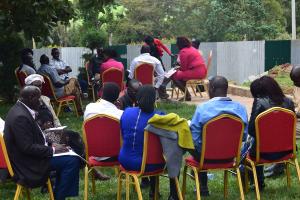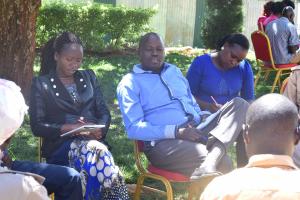Strengthening the capacity of CSOs on lobbying and advocacy in food security by looking at social accountability tools. - Foundation Office Kenya
Workshop
Details
KAS, Kenya Office held two seminars geared towards strengthening the capacity of CSOs on lobbying and advocacy in the area of food security by looking at social accountability tools on the 25th - 28th April, 2017 and 4th -7th May, 2017 respectively in West Pokot and Baringo Counties.
The food insecurity and drought episodes witnessed in Baringo and West Pokot Counties require for certain short, mid and long term solutions which are derived from political and policy processes. However, understanding the politics and how the laws and policies ought to work is one thing but the democratic methods for exerting pressure for such processes to work successfully for poor communities in another task all together. Lobbying and advocacy is such a method as it allows space for different Non State Actors to mount considerable amount of pressure for making decisions to be made and implementation of such decisions to be fair and sound in dealing with the realities on ground. In the ASAL areas like Baringo and West Pokot, lobbying and advocacy needs to be pinned on priority issues especially within the education, road infrastructure, agriculture, livestock, community security, health and nutrition and local market sectors; which are key in promoting an enabling food security situation.
On the other hand, the how to go about lobbying and advocacy for issues is one delicate yet important phase which requires generation of information to mount evidence that can be used to make decisions within the different sectors. This means being able to lay out an information gathering framework that collects and collates the perceptions of the different local communities as well as actual state of affairs in the different parts of the county and sector. Such processes of information gathering speak to social accountability. How to go about lobbying and advocacy therefore emanates from the types of social accountability tools that have been explored and used. The trainings held were therefore meant to look at how lobbying and advocacy could be conducted in a way that would contribute to the promotion of food security priority issues within the two ASAL counties but based on evidences from social accountability tools such as public expenditure tracking surveys (PETS), social audit, community petition, citizen report cards, community score cards and budget analysis.
The training in West Pokot County took place at Kapenguria where 30 active members from CSOs and stakeholder members of ASF were engaged as participants, while in Baringo County, the seminar took place at Kabarnet where 29 participants were engaged. The target groups consisted of women organizations, youth groups, and organizations working on governance aspects of food security, organizations working on the technical and production aspects of food security like the farmers’ associations among others. Local organizations working with communities to create awareness on disaster risk reduction and resilience building were also engaged. The trainings used approaches such as presentations, role-play, e-cases and syndicate group works. At one point during the training sessions, the participants were at divided into groups where they discussed the challenges and opportunities facing the local communities in the two counties and how the different social accountability tools could be used to generate evidence for uptake during lobbying and advocacy campaigns.
With the knowledge gained, the participants pointed out that some of the major challenges they faced included: the lack of political goodwill from the two tiers of government to work with communities based on community owned development plans which integrates in most cases, home grown solutions, to problems like the scarcity of water which in the long run contributes to the on-going human and animal food security problems. Other challenges mentioned were: lack of local people with skilled labor in the community to sustain engagements and small developments that have been started; the over dependence on the few NGOs available especially ones in the relief and development aid realms; as well as the presence of weak service delivery structures that are not able to reach boarder points and lowlands of the two counties. Despite the challenges, discussion by the participants also generated a number of ways forward to continue with evidence based lobbying and advocacy in the area of food security based on their various organizations mandate. One key point that was generally agreed was the need to attempt and carry out social audits on government projects that address disaster risks immediately after the August general elections.





